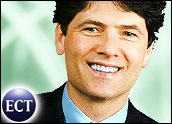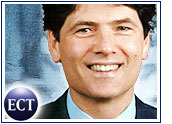
When I was in high school, the summer reading list included titles like Great Expectations that were sure to induce a coma-like state if I tried to read them while hanging out at the pool or beach. As adults we look for mindless potboiler paperbacks to stuff in the beach bag and maybe we feel a bit guilty for it. But if you are looking for guilt-free reading that might even help your professional life when you get back to the desk in September, I can recommend several titles that will keep your attention when the sun gets high and motivation is low.
Relating to Everybody
First, take a look at Clayton Christensen’s Seeing What’s Next: Using the Theories of Innovation to Predict Industry Change. Christensen wrote The Innovator’s Dilemma and The Innovator’s Solution, each of which deals with different aspects of the problems successful companies have in changing gears and why it is imperative that they do so. Even if you are a casual observer of the ebb and flow of entrepreneurial companies, chances are good that you will read these books and think they apply to your own observations of success and failure in CRM and elsewhere. You will be right.
In Seeing What’s Next, Christensen, a Harvard Business School professor, teams up with high powered consultants Scott Anthony (Innosight, LLC) and Erik Roth (McKinsey & Co.) to use the learnings from the first two books to provide a proactive approach to the challenges of competition in new markets and categories. The book can be dense in spots and I thought it could have benefited from better proof reading, but it is a worthwhile read nonetheless.
Going Global
Next, check out The World is Flat: A Brief History of the Twenty-First Century by Thomas Friedman. This New York Times foreign affairs columnist and Pulitzer Prize winner for “The Lexus and the Olive Tree: Understanding Globalization” uses the flat earth as a metaphor to demonstrate how easily jobs, companies and capital can flow around the planet to get a job done in the most effective and efficient manner (read cheapest). This is not exactly an apology for job export that we’ve experienced over the last few years — what Ross Perot once called “that great sucking sound” (how did this incredibly articulate and funny guy not become president?) — but it does leave you with the impression that we will simply innovate our way to the next big economic driver. I have a small problem with that.
It was hard enough in the 1970’s — when steel production went to places like Japan and Korea — to retrain steel workers as lesser paid service workers. What might happen when our tech economy moves irretrievably off shore to be replaced by the medical/pharmaceutical/biotech new order? Will all of we tech nerds suddenly retrain as protein chemists or will we find fulfillment and a living wage changing bed pans?
I digress.
Keeping Creativity
That brings us to the third book, Daniel Pink’s, A Whole New Mind: Moving from the Information Age to the Conceptual Age. Pink might make you wonder if there will be a desk to return to once the weather turns crisp. New Mind contains some bad news for the back office crowd: if your job is very left-brained like accounting and programming, anyone can do it or it can be automated away. Does that mean right-brained creative types will now inherit the earth? If they do, abandon all hope of trains and planes that run on time.
I am in California this week attending Salesforce.com’s latest announcement and bash and looking for clues about what happens next in this marketplace. My bet is that the books mentioned here and several more all point to a future that will be richer and more exciting than anything we’ve seen yet. It seems to me, and I have said this before, the age of the customer is dawning and it will have little to do with the transaction oriented CRM that we have seen so far. Paul Greenberg sees much the same things percolating when he talks about the customer experience. We’ll see. Combining Pink’s vision and the inevitable turns of the market that Friedman and Christensen talk about tells me that CRM is going to look different and be a lot more fun shortly.
You can be sure if I see some interesting companies out here that share that vision, I’ll be writing about them soon.
Denis Pombriant is a well known thought leader in CRM and the founder and managing principal of the Beagle Research Group, a CRM market research firm and consultancy. Pombriant’s latest report, CRM WizKids: Taking CRM to the Next Level, identifies emerging CRM leaders and their innovative technologies. In 2003, CRM Magazine named Pombriant one of the most influential executives in the CRM industry. Pombriant is currently working on a book to be published next year. He can be reached at [email protected]























































Social CRM
See all Social CRM